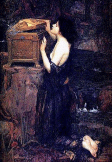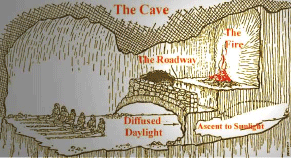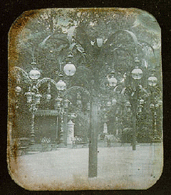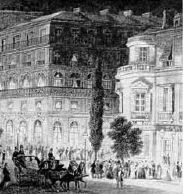emily morris
[When Prometheus stole fire from the gods, in retaliation] Zeus told the fabled craftsman Hephaestus to create a gift, to combine dirt and water and form a beautiful maiden just like the immortal goddesses… then Zeus instructed Hermes to fill her full of shameless trickery and deceit… Hermes named this female ‘Pandora’: she who gives all gifts.
Epimetheus had forgotten that his brother Prometheus had warned him not to accept a gift sent by Olympian Zeus, to return it in case it should prove an evil to mankind. But Epimetheus took the gift. Only later, when the evil was his own, did he comprehend.”
— Hesiod, Work and Days

Timeo Danaos et dona feretes. (I fear Greeks, even those bearing gifts.) — Virgil, The Aeneid
We said, in the first volume, that every historical period is bathed in a distinctive light, whether diurnal or nocturnal. Now, for the first time, this world has an artificial illumination in the form of gaslight, which burst onto the scene in London at a time when Napoleon’s star was beginning to decline, which entered Paris more or less contemporaneously with the Bourbons, and which, by slow and tenacious advances, finally took possession of all streets and public localities. By 1840 it was flaring everywhere, even in Vienna. In this strident and gloomy, sharp and flickering, prosaic and ghostly illumination, large insects are busily moving about: shopkeepers.
— Egon Friedell, Kulturgeschichte der Neuzeit


Prometheus, half-mortal son of Zeus, stealing fire from the gods. (right: Andre Durand, 1997)




Paris, City of Lights, illuminated in the nineteenth century by gaslight.
Left: 1955 daguerrotype (unknown photographer) of a Parisian gaslamp
Right: Parisians strolling after dark at the intersection of Boulevard des Italiens and Rue Lafitte. Drawing by Eugene Lami (1842).It was Paris, of course, the City of Lights, that reified Prometheus’ gift. A mythical and uncontrollable force became, through man’s ingenuity, an exchange commodity as it was no longer passed from torch to torch, or created anew with flint and sparks. Since the gift of fire and the symbolic light that it cast on the walls of mankind’s proverbial cave, light evolved from the mythical gift and social metaphor to an exchange commodity, distributed through companies and bought with subscriptions.
Paris was illuminated in 1814 by 5,000 street lamps that were serviced by 142 lamplighters. On June 3, 1825 the Place Vendôme, Paris’ celebrated square, was lit for the first time by the Compagnie du Gaz Portatif Français who placed four multiple-jet street lamps at the corners of the columns and two street lamps at the corners of the Rue de Castiglione. Place Vendôme became the first public square (and a historic one, home to Victor Hugo and other Parisian notables) that could bring people together at any hour. Light enabled man to cross the boundary between indoors and outside, between the constraints of nature and limitless possibilities, between enforced isolation and encouraged socialization. Light became simultaneously purchasable and also publicly available, free for all who stood in its glow.
The year after Place Vendôme’s lighting, there were 9,000 gas burners in Paris - by 1828 there were 10,000 and 1,500 subscribers, three gas companies, and four gas-jet factories.[1] Light had become a self-perpetuating system of commerce. It was a business unto itself, and also changed the hours and possibilities of the business world. The Arcades, the great shopping halls of Paris that were temples of a nascent modernity with their steel constructions and wares of industrialization “radiated through the Paris of the Empire like fairy grottoes.” Walter Benjamin, the great chronicler of Paris’ metamorphosis into modernity, traced the steps of someone entering the Passage des Panoramas in 1817, where “the sirens of gaslights would be singing to him on one side, while oil lamp odalisques offered enticements from the other.” With electricity, though, “the irreproachable glow was extinguished in these galleries, which suddenly became more difficult to find – which wrought a black magic at entranceways, and which looked within themselves out of blind windows.” Light, apparently, had a dark magic, one that concealed as well as revealed. Pandora was not entirely forgotten; she lurked in the shadows that light could not reach.[1] Dubech & d’Espezel, Histoire de Paris (in Walter Benjamin’s The Paris Arcades, Convolute T: Modes of Lighting)